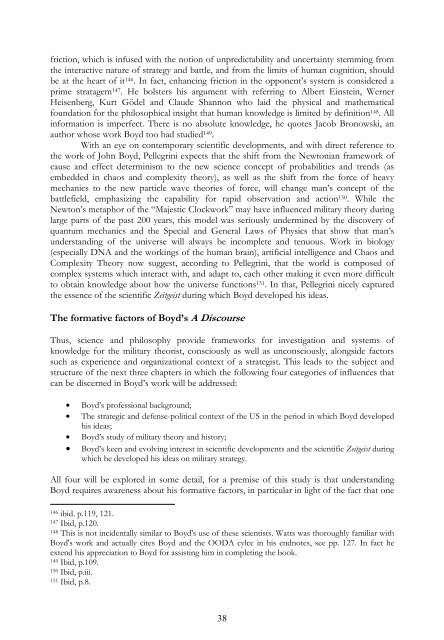Science, Strategy and War The Strategic Theory of ... - Boekje Pienter
Science, Strategy and War The Strategic Theory of ... - Boekje Pienter
Science, Strategy and War The Strategic Theory of ... - Boekje Pienter
You also want an ePaper? Increase the reach of your titles
YUMPU automatically turns print PDFs into web optimized ePapers that Google loves.
friction, which is infused with the notion <strong>of</strong> unpredictability <strong>and</strong> uncertainty stemming fromthe interactive nature <strong>of</strong> strategy <strong>and</strong> battle, <strong>and</strong> from the limits <strong>of</strong> human cognition, shouldbe at the heart <strong>of</strong> it 146 . In fact, enhancing friction in the opponent’s system is considered aprime stratagem 147 . He bolsters his argument with referring to Albert Einstein, WernerHeisenberg, Kurt Gödel <strong>and</strong> Claude Shannon who laid the physical <strong>and</strong> mathematicalfoundation for the philosophical insight that human knowledge is limited by definition 148 . Allinformation is imperfect. <strong>The</strong>re is no absolute knowledge, he quotes Jacob Bronowski, anauthor whose work Boyd too had studied 149 .With an eye on contemporary scientific developments, <strong>and</strong> with direct reference tothe work <strong>of</strong> John Boyd, Pellegrini expects that the shift from the Newtonian framework <strong>of</strong>cause <strong>and</strong> effect determinism to the new science concept <strong>of</strong> probabilities <strong>and</strong> trends (asembedded in chaos <strong>and</strong> complexity theory), as well as the shift from the force <strong>of</strong> heavymechanics to the new particle wave theories <strong>of</strong> force, will change man’s concept <strong>of</strong> thebattlefield, emphasizing the capability for rapid observation <strong>and</strong> action 150 . While theNewton’s metaphor <strong>of</strong> the “Majestic Clockwork” may have influenced military theory duringlarge parts <strong>of</strong> the past 200 years, this model was seriously undermined by the discovery <strong>of</strong>quantum mechanics <strong>and</strong> the Special <strong>and</strong> General Laws <strong>of</strong> Physics that show that man’sunderst<strong>and</strong>ing <strong>of</strong> the universe will always be incomplete <strong>and</strong> tenuous. Work in biology(especially DNA <strong>and</strong> the workings <strong>of</strong> the human brain), artificial intelligence <strong>and</strong> Chaos <strong>and</strong>Complexity <strong>The</strong>ory now suggest, according to Pellegrini, that the world is composed <strong>of</strong>complex systems which interact with, <strong>and</strong> adapt to, each other making it even more difficultto obtain knowledge about how the universe functions 151 . In that, Pellegrini nicely capturedthe essence <strong>of</strong> the scientific Zeitgeist during which Boyd developed his ideas.<strong>The</strong> formative factors <strong>of</strong> Boyd’s A DiscourseThus, science <strong>and</strong> philosophy provide frameworks for investigation <strong>and</strong> systems <strong>of</strong>knowledge for the military theorist, consciously as well as unconsciously, alongside factorssuch as experience <strong>and</strong> organizational context <strong>of</strong> a strategist. This leads to the subject <strong>and</strong>structure <strong>of</strong> the next three chapters in which the following four categories <strong>of</strong> influences thatcan be discerned in Boyd’s work will be addressed:• Boyd’s pr<strong>of</strong>essional background;• <strong>The</strong> strategic <strong>and</strong> defense-political context <strong>of</strong> the US in the period in which Boyd developedhis ideas;• Boyd’s study <strong>of</strong> military theory <strong>and</strong> history;• Boyd’s keen <strong>and</strong> evolving interest in scientific developments <strong>and</strong> the scientific Zeitgeist duringwhich he developed his ideas on military strategy.All four will be explored in some detail, for a premise <strong>of</strong> this study is that underst<strong>and</strong>ingBoyd requires awareness about his formative factors, in particular in light <strong>of</strong> the fact that one146 ibid. p.119, 121.147 Ibid, p.120.148 This is not incidentally similar to Boyd's use <strong>of</strong> these scientists. Watts was thoroughly familiar withBoyd's work <strong>and</strong> actually cites Boyd <strong>and</strong> the OODA cylce in his endnotes, see pp. 127. In fact heextend his appreciation to Boyd for assisting him in completing the book.149 Ibid, p.109.150 Ibid, p.iii.151 Ibid, p.8.38
















